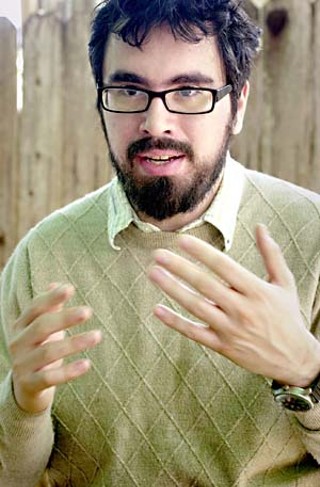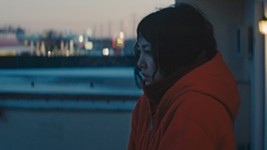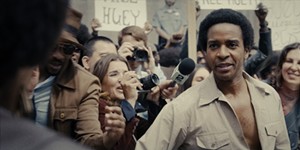The Bee's Knees
Andrew Bujalski's uncommon process
By Kimberley Jones, Fri., March 13, 2009

Andrew Bujalski shoots on film and edits on a Steenbeck, which makes him – or at least his process – something of a dinosaur in the current indie film climate. That means making movies for Bujalski may be more labor-intensive than for most, but it's working, for sure: His pictures, including Funny Ha Ha and Mutual Appreciation, are funny, affecting, but never affected. Where they really sing is in the space between the beats, in the seesawing intimacy and awkwardness that seem to attend all human interaction.
The Chronicle recently sat down with Bujalski over sandwiches at Avenue B Grocery to talk about his latest film, Beeswax, which world-premiered last month at the Berlinale film festival and features no fewer than six local directors in supporting parts, as well as South by Southwest Film Producer Janet Pierson (cast a couple of years before she signed on to the Fest). It follows two sisters (played by real-life twins Tilly and Maggie Hatcher), one who is drifting – away from a boyfriend, toward an overseas job – while the other tussles for control of a co-owned vintage shop in Austin.
Austin Chronicle: Where did the idea of Beeswax begin?
Andrew Bujalski: I think the seed of all of my films, or at least with these three, has been beginning with imagining the person who was going to play the lead. For years I've had it in the back of my head that I'd like to do a film with the Hatcher sisters, who I've known for a long time. I met Maggie in college. She actually acted in a student film I did years ago. And shortly thereafter, I met her sister. Of course, they're both perfectly charismatic people, and the fact that they're twins makes it a supernova of charisma.
AC: So do all your charismatic friends sort of wait around for you to fashion a film around them?
AB: I don't know. There was a time in which I thought that half my friends were mad at me for putting them in a film, and half my friends were mad at me for not putting them in a film. But I don't worry about it too much.
AC: You have, I think, six different Austin directors acting in the film. Is that uncomfortable for you at all to have other directors on set?
AB: Not particularly. ... I think, generally speaking, directors often have great instincts as actors. So I was just tapping into that. It's nice that – certainly these people in particular – they have everything I want from a nonactor, which is that you know they're kind of necessarily going to explore a scene organically and not fall back on any kind of training as actors, but they also know what we're doing, there's familiarity with the process. Which maybe makes finding that comfort level a little quicker, a little easier.
AC: I thought it was interesting this was your first film you haven't acted in. I interviewed Alex Karpovsky last week for his film Trust Us, This Is All Made Up [see "The Watchmen"], and he said he'd had his suspicions that the role he played was one you had written for yourself. He said you flatly denied it.
AB: I continue to flatly deny it.
AC: Why did you choose not to act in this one?
AB: I didn't feel like I had anything to give to it as an actor. Certainly when I was looking at other people for the role and especially now in retrospect, I look at what Alex was able to do with the role, and I don't think I could have brought that or anything better.
When I acted in Funny Ha Ha, it was pretty new to me, and there was something I could give to that character. And in Mutual Appreciation, I thought I could give something different as an actor, and I tried to. I feel like I pretty well found my range, and that's it. And I didn't want to act again unless I thought I had something new to give.
AC: So you shot on film, you edited on a Steenbeck, and it was fully scripted, right? Or was there improvisation on set?
AB: I don't know what standards people are judging by. And I tend to fall back on this philosophical notion that all acting is improvisation in some sense. I guess when people ask that question, what they mean is, "Are the words coming out of their mouths the words exactly as they're written on the page?" I've never done a word-to-word analysis. I know it's not 100 percent, but I know it's some percent. And probably a larger percent than most people seem to want it to be.
AC: What do you mean "seem to want it to be"?
AB: I guess it often feels like when that question is asked, people seem to want one or the other – they either want Shakespeare-slash-David Mamet precision, or they want everybody to be making it up. And it's hard to explain that it's more complicated than that.
AC: I have no ulterior motives with that question.
AB: [Laughs] Sorry.
AC: No, it was more a question of the time-intensiveness of those elements. How long has the process been in making Beeswax?
AB: It was almost exactly George Bush's second term. We realized that when we were watching the first finished print of the film during the inauguration, and the lights came up in the screening room, and we looked at our watches, and I kind of realized that I pretty much started this exactly four years ago.
Mutual Appreciation we premiered at South by Southwest in March of '05, and that was when I was starting to dream up this thing. ... I was living in Boston, and we were starting to talk about where should we shoot this, and there was no obvious place. I lived in Boston, the girls at that time lived in Atlanta and New Haven, and I was working with the same producers I'd worked with in the past, who were in New York and L.A. ... So we talked about other places, and of all the other cities that kind of got thrown out there, Austin was the only one that really made any kind of sense, because I had lived here before, and so I did have a sense of plugging into the community – it's not like we were going to show up in town and not know anything or anybody.
And one of the things that really did it was I came down here for a week to scout locations. I needed a wheelchair-accessible vintage-clothing store. My whole script depended on that ... and they're really hard to come by. Vintage stores are usually very cramped places, and that's part of their charm, but I started to panic a little bit, because I thought I had written something that doesn't exist. ...
So I spent a week driving around Austin. I went to every vintage store you could find. And the last place I walked in the door was Storyville on 51st and Duval, and it was eerily right on. It was so much how I had written it, down to there being this sort of back room behind the counter, which is what I had written. And the counters were low, so it also made sense that someone in a wheelchair would be back there. ... So that more than anything seemed like a sign from God that we should be here.
AC: A lot of people have remarked upon how, well, un-remarked-upon in the movie it is, the fact that Jeannie [played by Tilly Hatcher] is in a wheelchair – it's just a very comfortable-seeming lens into her world. Did she help you craft the character?
AB: Obviously, she was a great technical adviser. ... The only scene where quote-unquote disability is really kind of a significant, or foregrounded, factor is the scene where she's in the car and she realizes her chair's in the trunk. And that came from me asking her about nonobvious situations, and that was sort of an idea she put in my head.
But yeah, you know, when you're working with somebody who that's her daily life, it was something that all of us working on the film quickly got accustomed to. ... It was just a reality that was part of the film. But I know also, going into it, I talked to Tilly about – I think we were both excited about the idea of doing a film with a character with a disability that's not about the disability – that that's something you don't see that much. So that was a fun thing for us to try to do.
Beeswax
Spotlight Premieres, North American Premiere
Saturday, March 14, 2pm, Paramount










